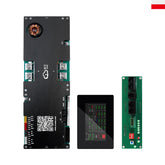Understanding Deep Cycle Batteries for Solar Energy Storage
Deep cycle batteries play a crucial role in solar energy systems, offering reliable storage solutions for the energy captured by solar panels. Whether you're new to solar energy or looking to upgrade your setup, understanding the features, benefits, and considerations of deep cycle batteries is essential to optimizing your system.
- What Are Deep Cycle Batteries?
- Why Choose Deep Cycle Batteries for Solar Energy Storage?
- Key Considerations When Buying Deep Cycle Batteries
- How to Maintain Your Deep Cycle Batteries
- Optimizing Solar Systems with Deep Cycle Batteries
- Advantages of Deep Cycle Batteries Over Alternatives
What Are Deep Cycle Batteries?
How Deep Cycle Batteries Differ from Regular Batteries
Unlike standard car batteries designed for short bursts of energy, deep cycle batteries are engineered to provide sustained power over long periods. They are specifically built to endure deep discharges repeatedly without compromising their lifespan. This makes them ideal for solar energy storage, where consistent energy is required throughout the day and night.
Types of Deep Cycle Batteries
When selecting a deep cycle battery, it’s essential to understand the various types available:
Lead-Acid Batteries
These are the most common and cost-effective option for deep cycle applications. They include flooded lead-acid (FLA) and sealed lead-acid (SLA) batteries. While affordable, they require regular maintenance, especially the FLA type.
Lithium-Ion Batteries
Known for their high energy density and longer lifespan, lithium-ion batteries are becoming increasingly popular in solar setups. Though more expensive upfront, they offer better efficiency and lower long-term costs.
Gel Batteries
A subtype of lead-acid batteries, gel batteries use a gelified electrolyte, making them maintenance-free and suitable for various temperature conditions.
AGM (Absorbent Glass Mat) Batteries
These are another maintenance-free lead-acid option, providing excellent performance and durability. AGM batteries are often favored for off-grid solar systems.
>>See also What Are The Alternatives To A H6 Battery
Why Choose Deep Cycle Batteries for Solar Energy Storage?
Longevity and Durability
Deep cycle batteries are designed to withstand the demands of solar energy systems, enduring hundreds or even thousands of charge-discharge cycles.
Efficiency
Their ability to release power slowly and consistently ensures that your solar energy system runs efficiently, even during cloudy days or at night.
Versatility
From residential setups to off-grid systems, deep cycle batteries are adaptable to various solar energy applications, making them a preferred choice for many users.
Key Considerations When Buying Deep Cycle Batteries
Battery Capacity
Measured in amp-hours (Ah), capacity determines how much energy the battery can store. A higher capacity allows for longer energy supply during cloudy days or high-demand periods.
Depth of Discharge (DoD)
DoD indicates how much of the battery's capacity can be used without causing damage. For instance, a battery with a 50% DoD should not be discharged beyond half its capacity.
Cycle Life
Cycle life refers to the number of charge-discharge cycles a battery can endure before its performance degrades significantly. Lithium-ion batteries often boast a much higher cycle life than lead-acid options.
Cost
While lithium-ion batteries have a higher upfront cost, their efficiency and lifespan often make them more cost-effective in the long run compared to lead-acid alternatives.
Maintenance Requirements
Flooded lead-acid batteries require regular water topping and cleaning, while gel, AGM, and lithium-ion batteries are virtually maintenance-free.
How to Maintain Your Deep Cycle Batteries
Regular Inspections
Check for signs of corrosion, leaks, or damage. Catching these issues early can prolong your battery's lifespan.
Proper Charging Practices
Avoid overcharging or undercharging your batteries, as this can significantly shorten their lifespan. Use a high-quality charge controller to regulate voltage levels.
Storage Conditions
Keep your batteries in a cool, dry place. Extreme temperatures can negatively impact performance and longevity.
Equalization (For Lead-Acid Batteries)
Flooded lead-acid batteries benefit from occasional equalization charges, which help to balance the cells and remove sulfate buildup.
>>See also What Can A 12V 100Ah Battery Power
Optimizing Solar Systems with Deep Cycle Batteries
Pairing Batteries with Solar Panels
Ensure that your battery capacity aligns with your solar panel output. A mismatch can lead to inefficient energy storage and usage.
Using Inverters
Inverters are essential for converting stored DC power into usable AC power for appliances. Choose an inverter compatible with your battery type and capacity.
Monitoring Systems
Invest in a battery monitoring system to track performance and identify potential issues early.
Advantages of Deep Cycle Batteries Over Alternatives
Deep cycle batteries are uniquely suited for solar energy storage because of their resilience and efficiency. Unlike standard batteries, which might falter under frequent deep discharges, deep cycle options maintain consistent performance over time, reducing the need for frequent replacements.
Deep cycle batteries are a cornerstone of effective solar energy storage. Their ability to deliver reliable, long-lasting performance makes them indispensable for anyone aiming to harness the power of the sun. By understanding the different types, maintenance needs, and considerations for selecting the right battery, you can ensure a sustainable and efficient solar setup.
Whether you're just beginning your solar energy journey or enhancing an existing system, investing in high-quality deep cycle batteries will pay dividends in energy savings and system reliability.



















Leave a comment
All blog comments are checked prior to publishing